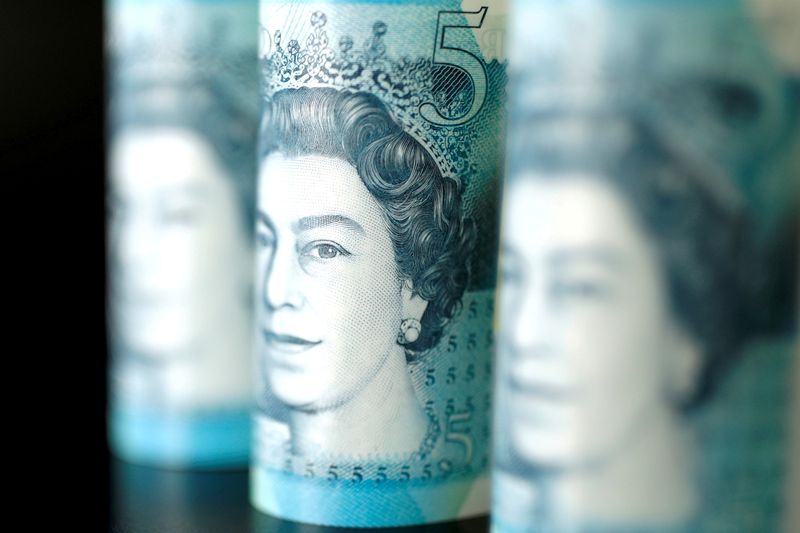By Ritvik Carvalho
LONDON (Reuters) -Sterling hit a new 5-week high against the dollar and a 3-week high to the euro on Tuesday, supported by labour market data that showed the total number of payrolled employees in Britain has climbed to pre-pandemic levels.
The dollar dipped after data showed underlying U.S. consumer prices increased at their slowest pace in six months in August, extending the pound's rise.
Sterling has been range-bound in recent days as investors assess Britain's post-lockdown economic recovery and how that may play into the Bank of England's stance on interest rates, currently at record lows.
British employers added a record 241,000 staff to their payrolls last month, lifting the total number of payrolled employees just above the level they were before Britain first went into a COVID-19 lockdown last year, official data showed on Tuesday.
Businesses reported more than 1 million vacancies in August - an all-time high - and the unemployment rate fell slightly to 4.6% in the three months to July, the Office for National Statistics said, in line with economists' expectations in a Reuters poll.
The data shows continued recovery in Britain's job market as the government phases out its furlough support programme, which will finish on Sept. 30.
Sterling made a steady climb into positive territory after the UK data, which was released at 0600 GMT and hit a fresh 5-week high of $1.3913 in the London afternoon as the greenback dipped after the U.S. inflation data.
By 1431 GMT, sterling traded 0.2% higher at $1.3861.
Against the euro, the pound was 0.1% higher at 85.25 pence per euro, off a 3-week high of 85.11 pence hit on Monday.
"Sterling is doing well this morning after promising UK labour market data, which showed payrolled employment having now eclipsed its pre-pandemic level, and another pleasing fall in the unemployment rate," said Michael Brown, senior market analyst at Caxton FX.
"GBP is also likely finding support as a result of signs of increasing wage pressures - vacancies at an all-time high, and earnings continuing to increase at a rapid clip - which may be causing market participants to bring forward their expectations of a BoE hike. Steadier global risk appetite, with signs of equity dip buyers beginning to emerge, will also be helping the high beta GBP."
INFLATION DATA
Elsewhere in economic news, British grocery prices rose 1.3% on a like-for-like basis in the four weeks to Sept. 5 year-on-year, with supermarket promotions hitting record lows, market researcher Kantar said on Tuesday. It said that for much of 2021 shoppers were shielded from price increases, with more products being sold on promotion compared to 2020.
Inflation data is due on Wednesday and retail sales data is due on Friday.
The Bank of England expects inflation to rise sharply this year and hit a peak of 4%. A strong reading for inflation would reinforce expectations that the Bank of England (BoE) is set to tighten its monetary policy quicker than the European Central Bank or the U.S. Federal Reserve.
A Reuters poll found that investors believed the BoE will raise borrowing costs by the end of 2022.
"What will be interesting from the BoE this month is how they balance the data which has mostly been strong and therefore supportive of what they said last month about rate hikes with the weaker elements such as retail sales," said Kiran Ganesh, head of multi-asset at UBS Global Wealth Management.

"So the BoE may be incrementally more dovish this month because of pressures on consumers."
But at the big picture level the BoE will be one of the earlier hikers and that sits well with the pound which is still somewhat undervalued, Ganesh said.